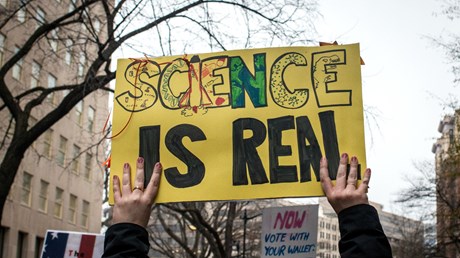How evangelical scientists square their place in the global movement.

Hundreds of thousands of researchers, educators, and doctors will take to the streets tomorrow, holding nerdy signs and sporting pins with slogans like “I Believe in Science.”
For many of them, that’s not all they believe in. Evangelicals’ involvement in the upcoming March for Science reflects their unique place in the sector. Despite all the motivations and concerns they share with their secular counterparts, there’s still some tension over how their faith fits in a field built on empirical facts—especially as the movement employs those facts toward political ends.
The event was initially inspired by fear over anticipated “gag orders” on government scientists following President Donald Trump’s inauguration. The march ballooned from Washington, DC, to more than 500 locations worldwide. Over the past three months, organizers pushed for the scientific community to find common ground to celebrate the role of scientific discovery in society and policy.
“I would hope that the presence of Christians in the march can show that theists and non-theists can look through the microscope together and come to the exact same conclusions,” said Mike Beidler, the president of the Washington, DC, chapter of the American Scientific Affiliation, a network for Christians in science. “The only difference is that the theist then moves beyond the awe of discovery to an attitude of worship of the Creator.”
More than 2 million of the 12 million scientists in the United States identify as evangelical, according to research by Rice University sociologist Elaine Howard Ecklund. March organizers nodded to faith’s place at the march when their diversity committee stated a …
Source: Christianity Today Most Read